CSotD: What did you learn in school today?
Skip to comments
I’m tempted to say “So here we are,” between Swift and Moynihan, but we sure seem willing to slip even lower at any moment.
Moynihan suggested a chance for things to improve, while Swift seemed resigned to the belief that they wouldn’t. In fact, Swift, who was advising a younger clergyman, extended the thought:
Reasoning will never make a man correct an ill opinion, which by reasoning he never acquired: for in the course of things, men always grow vicious before they become unbelievers; but if you would once convince the town or country profligate, by topics drawn from the view of their own quiet, reputation, health, and advantage, their infidelity would soon drop off: This I confess is no easy task, because it is almost in a literal sense, to fight with beasts.
He wasn’t convinced it couldn’t happen; he was simply convinced that it was a hard slog and success was far from guaranteed.
That’s where we are, and it’s unlikely to improve on its own.
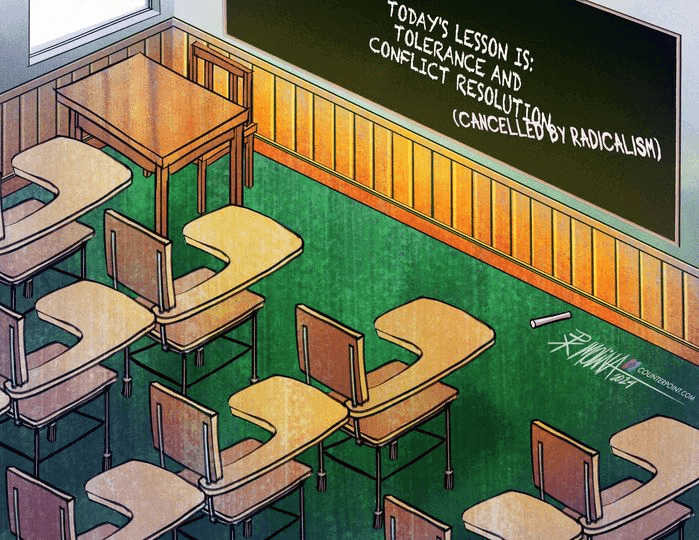
There is room for respectful differences, and I disagree with Pedro X. Molina (Counterpoint), because I don’t consider the student protesters to be particularly radical. Quite the opposite: I’m sure a number of them are playactors, what a conservative professor at my college called “dimestore Robespierres.”
But those aren’t normally a majority among the dissidents, and my experience in the days of Vietnam protests is that most of the demonstrators were visionaries who went on to shape and improve society in careers as teachers, mental health counselors, local politicians and so forth.
However, I don’t argue with Molina because I know his background and his reason for concern: Driven from Nicaragua by radicalism, it’s hardly surprising he’d be repulsed by any hint of it here.
His Robespierres were not of the dimestore variety.
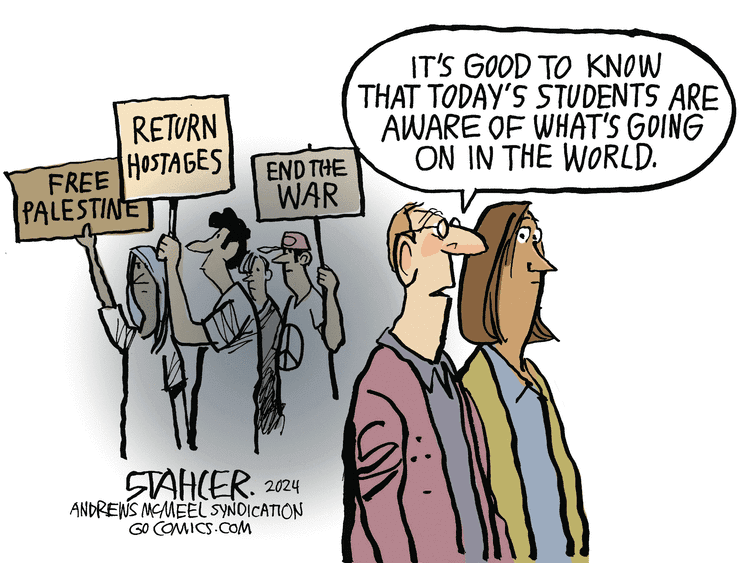
Like the man in this Jeff Stahler (AMS) cartoon, I’m glad to see the kids take an active part in trying to shape the world, though I wish the ones calling for an end to the bombardment were also calling for the release of the hostages, or doing so more prominently.
Then again, we never called for release of the POWs, because that was promised if there were a bombing halt, so that calling for an end to the war was, in fact, calling for a return of the POWs. To which I would add that I don’t think many of us accepted Jane Fonda’s assurances that the POWs were being well-treated. She was good at getting press coverage, but she literally was a playactor.
I’m also not impressed by all the whataboutisms being bandied about. Why aren’t the kids protesting over this, and over that, and over that other thing? Maybe they should be. But it doesn’t change what they are protesting over.
If you think something else matters more, start your own revolution.

And don’t expect, like the fellow in this Garth German cartoon, to be able to explain your motives and goals in any way that will penetrate those who have already decided what you’re doing. See Jonathan Swift, above.
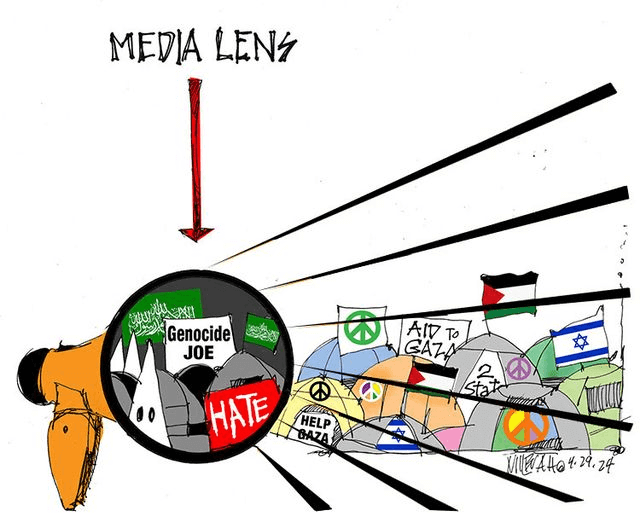
You need to be aware that the media has always been the media and, as Deb Milbrath explains it, they are looking for interesting material.
I’ve been in the crowd and I’ve been assigned to cover the crowd, and I promise you that few editors want a story about kids sitting around on blankets talking or singing or praying or lecturing on international law.
If you want to get on TV, you’ve got to stand out from the crowd. Shout something provocative. Wear a costume. Raise some hell.
You don’t have to be typical. You just have to be interesting.
Juxtaposition of the Day
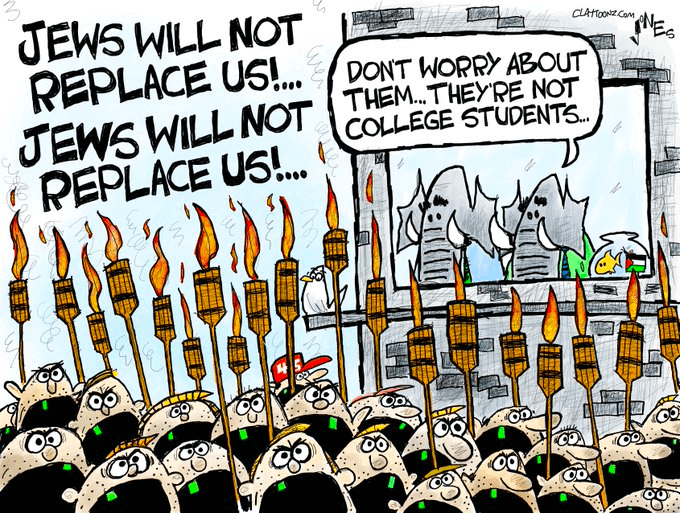
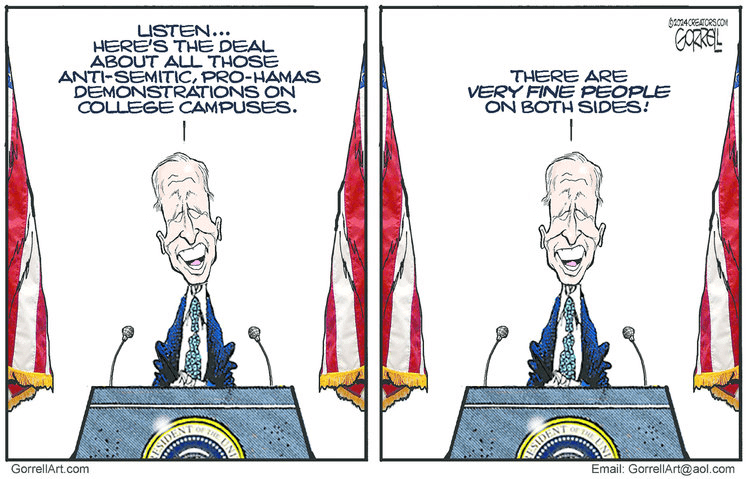
An interesting juxtaposition, and see Daniel Patrick Moynihan above for the key, because Jones cites the very real case of Charlottesville, in which an overtly anti-Semitic crowd shouted hateful chants in a demonstration that included the murder of a counterprotester, but were brushed off in a sort of “kids will be kids” fashion by the same people now calling for arrest of peaceful demonstrators.
Meanwhile, Gorrell bases his own opinion on his own facts, claiming without documentation that the current demonstrations are both anti-Semitic and pro-Hamas, and imagining that President Biden would use the same milquetoast excuse for them that Trump used for the Charlottesville marchers.
Jones accompanies his cartoon with a denunciation of dishonest arguments fiery enough that I wasn’t going to include a link. However, having seen several anti-demonstration cartoons in which their own opinions are justified by their own facts, I’ll provide the link and let Clay take any resulting heat.

Michael Ramirez (Creators) declares the protests to be violent, for instance, while the only violence seen at any of the demonstrations seems the indiscriminate arrests, tasings and tear gas assaults by police officers.
Ramirez doubles down on the accusation by setting his cartoon at Columbia, where, as has been repeatedly documented, including in this piece cited here yesterday, those who have actually visited Columbia have found nothing violent happening.
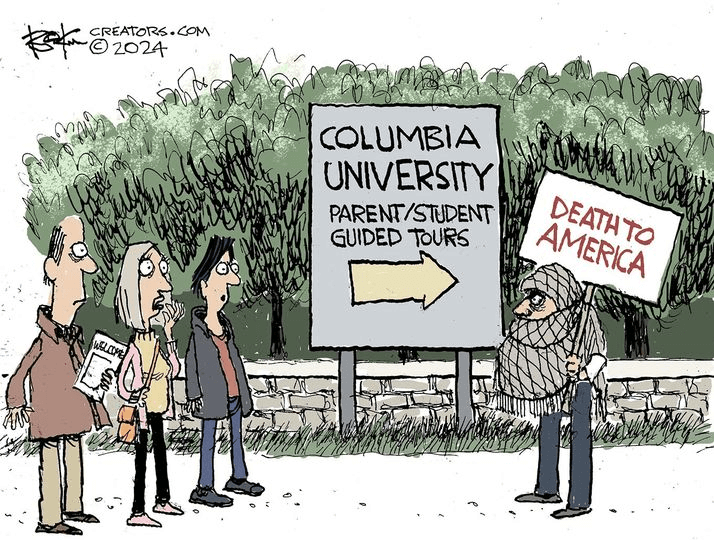
Given the number of people present, and the frequent, inevitable presence of a few dimestore Robespierres at any demonstration, Chip Bok (Creators) may be right that visiting high school juniors and their families could be put off.
Others have cited an assortment of posters as proof that everyone at the demonstration shares the same toxic opinions, which does put some onus on organizers to impose discipline. However, these things have been neither organized nor disciplined since the days of the Civil Rights Movement, and even then there were Stokelys pushing back against the Martins.
Could prospective students be put off? Sure, though Columbia has always had a contingent of red diaper babies.
However, there is no draft anymore, so taking a gap year won’t leave you crawling through a rice paddy.
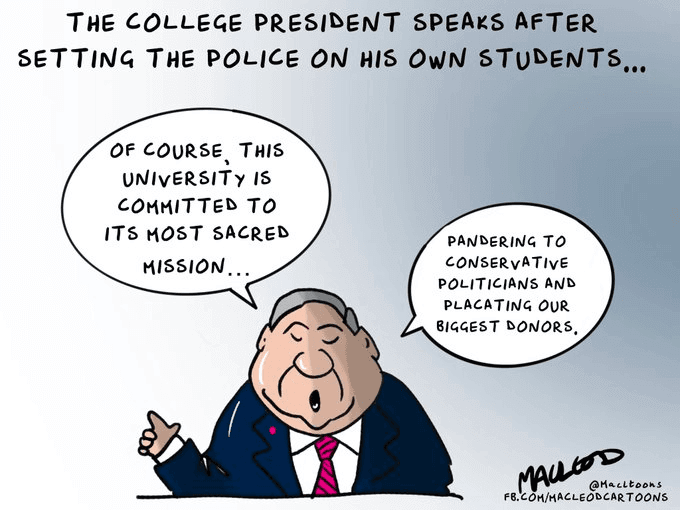
Or have a look at Vermont, at Middlebury or at UNH, where, unlike the president in Dr. MacLeod’s cartoon, administrators permit demonstrations and encourage dialogue with students.
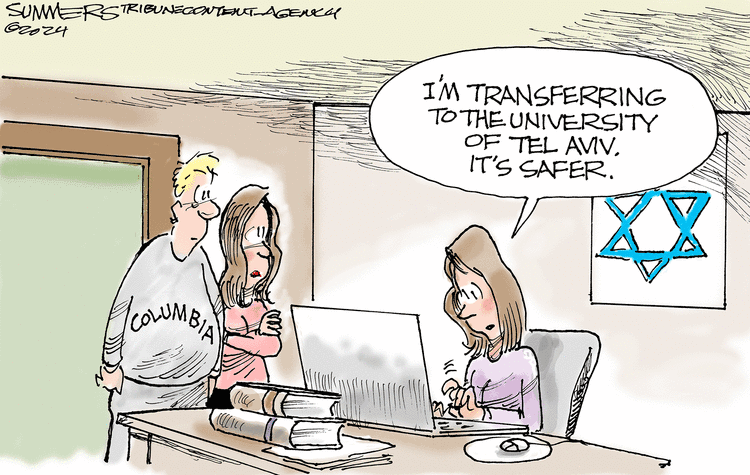
Or, as Dana Summers (Tribune) suggests, apply to the University of Tel Aviv. It’s a good school and some of the classes are in English.
But, no matter how fluent your Arabic, don’t bother applying to any of the universities in Gaza.

Comments 15
Comments are closed.